As he concluded his huddle with a gaggle of journalists after last week’s victory over Fiji in Scotland’s opening autumn Test, Gregor Townsend was thrown one final question.
It concerned the prospect of beating South Africa this Sunday. Were it to happen, the inquisitor ventured, where might such a result rank in his own achievements? “Do you think I’m going to answer that question?” Townsend grinned, without even pausing to consider an answer. “I’m probably not going to answer that question,” he reiterated, before making a hasty retreat to the sanctuary of the Murrayfield dressing room.
Given his record against the top three sides in world rugby, the head coach was perhaps understandably reticent to avoid a potential headline that could hint to the opposition he was already contemplating the delicious possibilities of such an outcome.
While he has an enviable record against the likes of England (won five and drawn one out of seven) and Australia (three wins from four) and presided over historic away wins over France and Wales, other nuts have proved harder to crack.
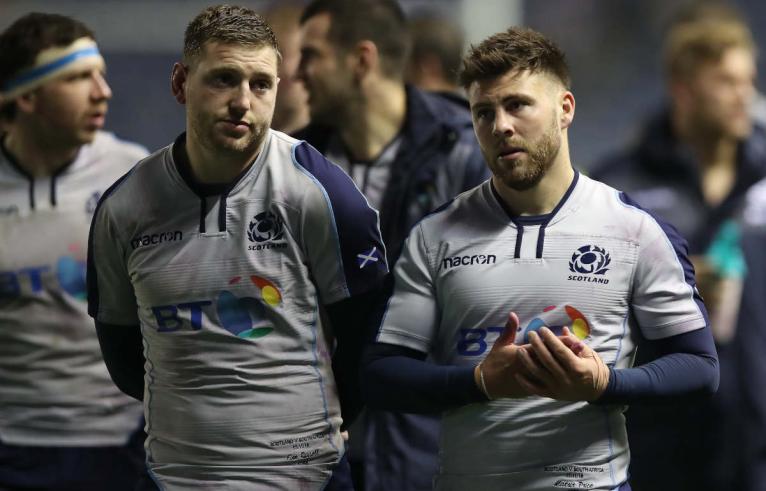
Two close shaves but no cigar against New Zealand. A miserable 10 straight defeats out of 10 against Ireland. And three losses from three meetings with the Springboks.
Scotland were well in contention in the first two, both at Murrayfield. In 2018 they trailed 17-20 after a scintillating first half before losing 20-26. In 2021, they even led 10-8 at the interval before ill-discipline allowed the Boks to stretch away to a 30-15 victory.
Then there was the World Cup pool meeting in Marseille last year. Scotland displayed admirable tenacity to stay within three points at half-time, before a familiar tale unfolded. South Africa cranked up a gear, scored two quick tries and then shut down the Scots’ increasingly frantic attempts at salvation for an ultimately comfortable 18-3 win.
Delve a little deeper into Townsend’s Scotland coaching CV though, and there is a victory over the Springboks there. Their last triumph in the fixture, back in November 2010. Only a fifth ever in 29 meetings overall. Only a second in 21 Tests since South Africa were readmitted to Test rugby in 1992 (as a player, he was a replacement in the other, a record 21-6 win in 2002).
Just as things seemed to be trending in the right direction, New Zealand rocked up in Edinburgh to kick off the autumn series and dished out a record 49-3 Murrayfield hammering of the shellshocked Scots
Townsend was in his second year of Test-level coaching then as an assistant to Andy Robinson, who was restoring his own reputation with Scotland after a successful two years at Edinburgh, following a tough time in the England job after succeeding Sir Clive Woodward.
Despite a calamitous late capitulation in Cardiff and defeat in Rome, the Six Nations had ended on a promising note, with a home draw against England and a stunning win over Ireland at Croke Park, still Scotland’s last success in Dublin. A 2-0 series victory in Argentina over the summer was also not to be sniffed at.
But just as things seemed to be trending in the right direction, New Zealand rocked up in Edinburgh to kick off the autumn series and dished out a record 49-3 Murrayfield hammering of the shellshocked Scots.
Scrum-half Rory Lawson was supposed to be leading the hosts that day, but he was still recovering from having a metal screw and plate fitted into his left hand five weeks earlier to accelerate the healing of a broken bone.
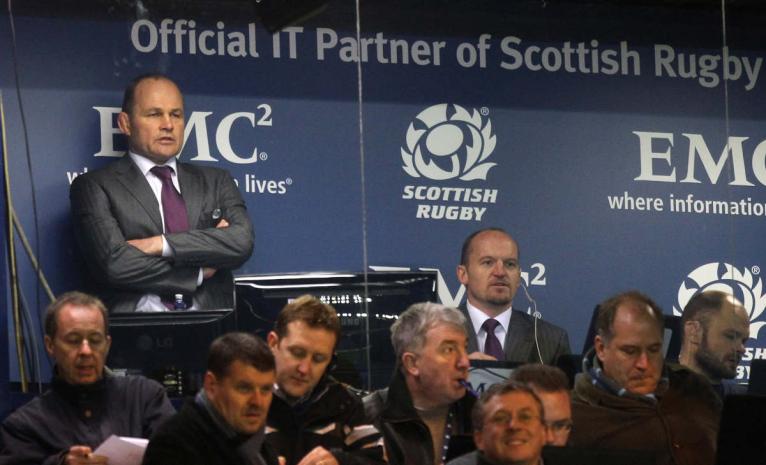
Instead, he was asked by Robinson to join him in the coaches’ box. A grim experience as the All Blacks ran amok with seven tries. Passed fit again, Lawson then took over from Mike Blair as scrum-half and captain for the visit of the Springboks the following week.
He was 29, and about to win his 21st cap in an era where Chris Cusiter and Blair had been jostling for first-choice status for the past six years. But it was only Lawson’s fourth Test start, and his first as captain.
“Leading the team out as captain of Scotland was an unbelievable privilege and moment in my career,” he recalled. “But as a captain, you want to be leading a winning team and it was a really tough week to take over.
“Preparing for South Africa, the boys were physically and mentally battered and pretty down, and we were facing the world champions.
They had seen us lose heavily the week before and probably arrived thinking an 80 per cent performance would be good enough.
“For me, we only had a chance if we got ourselves emotionally right for the battle of playing the Springboks. You need to be physically right obviously, and you need to know you have a strategy, but the best strategy in the world wouldn’t work if you didn’t get the emotion right. That was my focus, particularly in the last few days of the week and the minutes before the game, tapping into that and trying to get an emotional edge.
“I felt it was an area where we could get the better of the Springboks. They had seen us lose heavily the week before and probably arrived thinking an 80 per cent performance would be good enough. But I felt if we got ourselves emotionally right, we could get ourselves in the contest and then the belief could build off the back of that.”
For inspiration, Lawson looked to his legendary late grandfather, the Voice of Rugby Bill McLaren, who had died earlier that year.

“Papa (McLaren) passed away in the January of 2010, which was obviously incredibly sad,” he said. “On the Thursday before the game, we had the day off and I drove down to Hawick and had a bowl of soup on the high street with Nana and my mum and dad. I also went to visit Papa’s headstone.
“My mind opens up a bit when I travel and as I was driving down to Hawick, I thought ‘what can I possibly say to the guys tomorrow night?’ – after dinner on the Friday before they go to bed, to plant a seed. I went to the sweet shop across the road from the cafe and bought a couple of tins of Hawick Balls. Papa would always carry a tin of those sweets in his pocket. If anyone went up to him, he’d say, ‘There you go son, have one of those, that will give you an extra yard of pace tomorrow’. Or to some of the bigger lumps he’d say, ‘you should have two’.”
Back at the team hotel on Friday evening, Lawson stood up to address the Scotland squad, many of whom – the likes of Chris Paterson, Nathan Hines, Allan Jacobsen, Ross Ford, Sean Lamont, Euan Murray – had far greater big-match experience than himself.
The key thing is what that extra yard looks like, for you individually and us collectively… I believe if we win a cumulation of those yards, or even inches, we will win the game
“They knew the size of the challenge we were facing and had faced it many more times than I had,” Lawson recalled. “Rather than getting into anything tactical or strategic, I went for the emotional approach.
“I told a story about Papa and his Hawick Balls – with a bit more depth – and said to them, ‘whether you have a boiled sweet or not doesn’t bother me. The key thing is what that extra yard looks like, for you individually and us collectively. For me, it’s about that yard off the defensive line, about beating the Springbok who’s lying on the ground next to you off the ground and getting a yard further away from him. It’s about fighting for that extra yard beyond the collision. I believe if we win a cumulation of those yards, or even inches, we will win the game’.”
Lawson’s instincts proved correct.
South Africa still had half a dozen of their 2007 World Cup winners – including Bakkies Botha, Victor Matfield, Juan Smith, Francois Steyn and Jean de Villiers – plus ‘Beast’ Mtawarira and the Du Plessis brothers, Bismarck and Jannie, in the front row.
But the Edinburgh weather did its worst – “a stinker of a November day – wet, cold and miserable” – and the hosts flourished in the conditions.
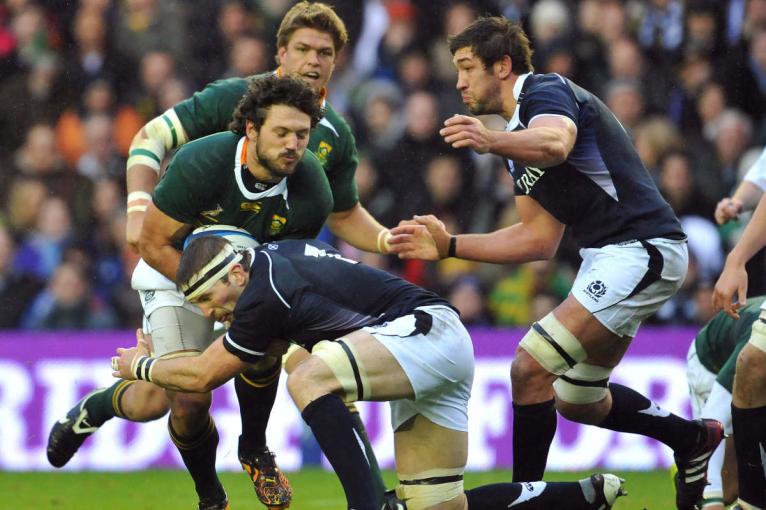
“I remember walking out into the tunnel, having been called by the ref for the coin-toss,” Lawson recalled. “Victor Matfield was captain of the Springboks that day and I remember looking across at him and thinking ‘oh my gosh, we could be in for a long afternoon’. But then I looked out and saw the rain coming in sideways and thought ‘I reckon we want to be here more than they do’.
Scotland fell 6-0 behind but three penalties and a scruffy drop-goal from fly-half Dan Parks put them 12-6 up before the boot of Morne Steyn brought the Boks level. As the hosts continued to go toe-to-toe in the forward exchanges – Hines, Richie Gray and a marauding John Barclay to the fore in a man-of-the-match display – Parks landed three more penalties to make it 21-12. A late Willem Alberts try made for a nervy finish, but Scotland closed it out for a seismic victory.
“The conditions probably dictated things,” Lawson said. “Their error count was higher. We kept things pretty simple. Parksy and I, and Hugo Southwell at full-back with his big left peg, kept the team playing in the right areas. South Africa got a bit ill-disciplined and Parksy kicked half-a-dozen penalties and a drop-goal. The feeling at the final whistle was without question my go-to moment in a Scotland jersey.”
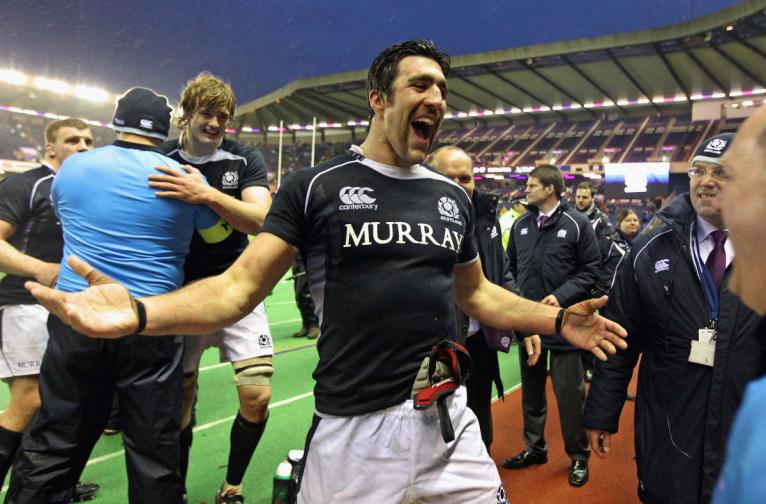
A sign of the times, after a decade of relative under-achievement in the home ranks, was the size of the Murrayfield crowd. Only 35,555 watched Scotland’s remarkable, rain-lashed triumph.
This Sunday, by contrast, will see the second of three capacity 67,000 crowds this autumn at the national stadium, with over 50,000 tickets also sold for the visit of Portugal on 16 November.
“The size of the challenge against the Springboks hasn’t changed, but it is a measure of how much talent and ability there is in this current Scotland squad and where they have taken the Scottish rugby public,” believes Lawson. “With that comes the pressure and expectation of being able to do something that has not been done since that (2010) day. It is a fascinating dynamic.”
Pieter-Steph du Toit is an incredible specimen. His ability, his endurance, his decision-making, his physicality, is all out of the very top drawer.
Lawson believes the South Africa challenge is a similar proposition to facing Ireland, the other current pre-eminent team in world rugby. Both have the ability to control the game tactically and keep Scotland’s dangerous attacking players in check, while capitalising on errors forced under the weight of huge defensive pressure.
In their World Cup meeting last year, two Boks in particular were instrumental to the outcome – flanker Pieter-Steph du Toit and under-rated outside centre Jesse Kriel.
“It is amazing the influence Du Toit has,” Lawson said. “He is an incredible specimen. His ability, his endurance to keep on going, his decision-making, his physicality, is all out of the very top drawer. He caused some challenges for Finn Russell in Marseille, he was always in his eyeline. But I think the way Sione Tuipulotu has been playing recently, the movement and timing around his axis with Huw Jones, can create space.
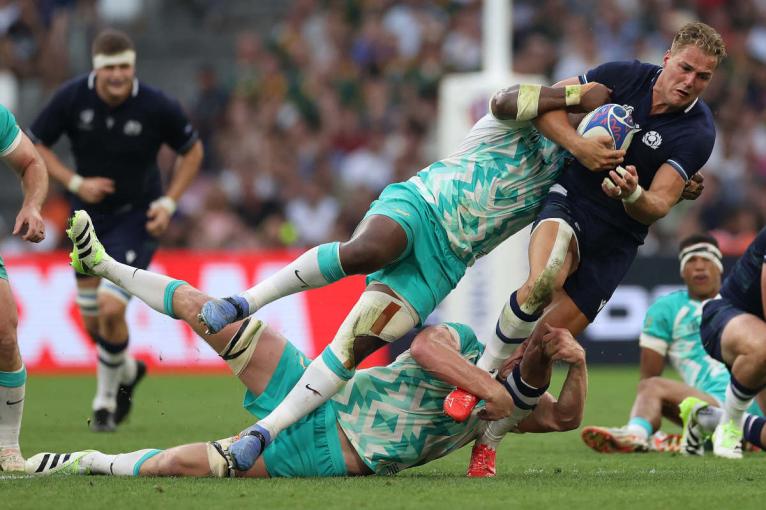
“In that World Cup game, Jesse Kriel must have made four attack-stopping decisions. It is the hardest position to defend in at 13 – players coming hard to the line but also the threat out the back – and he made four calls that were 50-50, or 60-40, and got them all bang-on. If a couple of those go differently or the move is run with slightly better timing and leads to two half-breaks, Scotland have the ability to take points from that.
“The Boks are packed with incredibly talented rugby players who know how to win Test matches and even if sometimes they look like machines, like everyone they have emotions. If Scotland can build some scoreboard pressure and get the crowd involved, the crowd can influence the players on the field and the officials. I really do believe they can put themselves in a position to win the game.
“They’ve got to try to create a bit of chaos and unsettle South Africa, whether that is setting up quick lineouts, front and back peels like they showed a little bit of against Fiji, or whether it is the full box of tricks from Finn’s attacking kicking game, trying to exploit one-on-ones with South Africa’s wingers. I think they really need to roll the dice and test the South Africa team in a way that unsettles them, rather than going toe to toe with them and thinking they will edge it by a score.”
If South Africa have a 6/10 or 7/10 day and Scotland have a better day than that, they could put themselves in a position to win it
Lawson, who will be part of the TNT Sports commentary team on Sunday, finds further solace in the constantly changing half-back combinations the double world champions have employed this year and the possibility the hosts, buoyed by their 57-17 win over Fiji last Saturday, might be “a bit sharper match-wise” while the Boks – despite a week’s training in Jersey before arriving in Edinburgh – may be “a little dusty”.
He also believes the strong Glasgow spine in the Scotland side will take “elevated confidence” into the game, having won the URC title in Pretoria earlier this year against a similarly powerful Bulls team. “Even if it is a club competition, it’s still against a South African team featuring a number of Springboks, on South African soil,” he noted.
“The key bit is getting the nuts and bolts right – the scrum, lineout and defence has to be good. But Scotland also have to be right on their game in attack. The last few games against South Africa, they have not been able to get their attacking game going. You have to be able to build scoreboard pressure against the Boks, something Scotland have struggled with.
“If South Africa have a 6/10 or 7/10 day and Scotland have a better day than that, they could put themselves in a position to win it, but they will have to do a lot right. It starts with the set-piece. If they concede five or six penalties under scrum pressure, it could make for a long afternoon.”


Comments
Join free and tell us what you really think!
Sign up for free